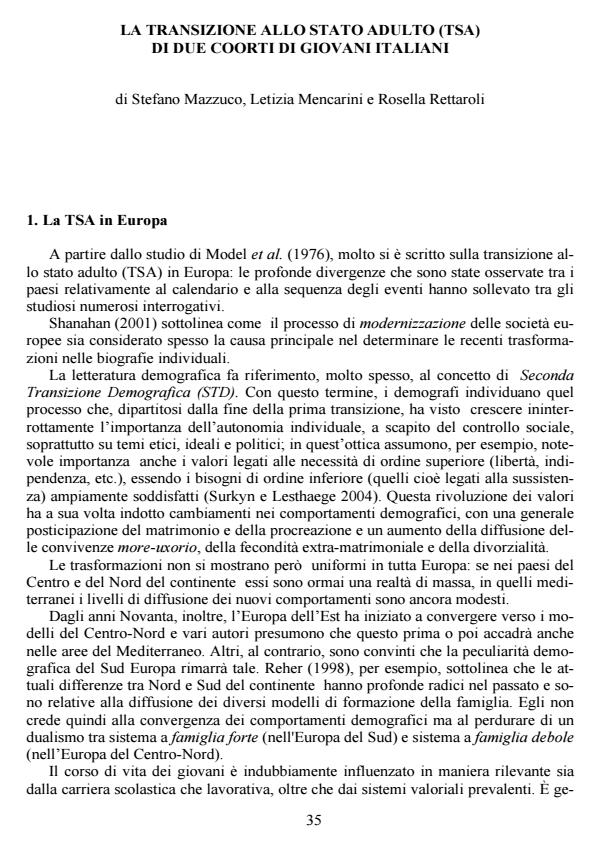La transizione allo stato adulto (TSA) di due coorti di giovani italiani
Journal title SOCIOLOGIA E POLITICHE SOCIALI
Author/s Stefano Mazzucco, Letizia Mencarini, Rosella Rettaroli
Publishing Year 2007 Issue 2007/2
Language Italian Pages 23 P. 35-57 File size 206 KB
DOI
DOI is like a bar code for intellectual property: to have more infomation
click here
Below, you can see the article first page
If you want to buy this article in PDF format, you can do it, following the instructions to buy download credits

FrancoAngeli is member of Publishers International Linking Association, Inc (PILA), a not-for-profit association which run the CrossRef service enabling links to and from online scholarly content.
The transition to adulthood of two different Italian cohorts ABSTRACT: Letizia Mencarini and Rosella Rettaroli In the paper, the authors present the results from a sub-sample of a nationally representative survey of young Italian adults. It’s recently conducted with a specific aim of studying crucial transitions in the life-course and their interconnections. The three focal aims of the study are the following. First question, have there been changes in the entry to adulthood for recent Italian cohorts? Patterns of timing and sequencing of crucial marker events are analysed separately for those aged 23-27 and 33-37, in the first half of 2004. Second question, what reasons do young adults have for leaving home, compared with the well-knows of previous generations, and do some specific sub-group of young individuals make different choices in terms of their transition to adulthood? Third question, what are the determinants of transition to parenthood, taking into account the sequence of previous ‘marker’ events of transitions to adulthood? In the beginning, the authors emphasise the geographical difference and describe the specific Italian context of late transition to adulthood and the lowest-low fertility. Suddenly, they make a descriptive analysis of timing and sequences of maker events at transition to adulthood, and reasons why young adults of the 1966-70 cohorts leave home. Then, they analysed the determinants of the transition out of parental home. Concerning the 1976-80 cohorts, they study their behaviour and the determinants of late parenthood. This empirical research has given interesting insights into the relationship between events signalling the transition to adulthood and parenthood. Summarising, for the authors, the effect of union formation and, particularly, marriage, dominate all the possible determinants of fertility. Moreover, it is possible to pinpoint a slight acceleration in leaving home among the younger cohort, in contrast with the older one due to the educational and learning process.
Stefano Mazzucco, Letizia Mencarini, Rosella Rettaroli, La transizione allo stato adulto (TSA) di due coorti di giovani italiani in "SOCIOLOGIA E POLITICHE SOCIALI" 2/2007, pp 35-57, DOI: